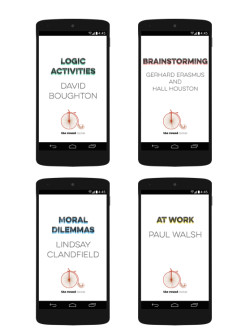My new book published by the Round as part of their ‘Minis’ series is out!
Big thanks to Lindsay Clandfield for steering the book to completion, editor Penny Hands for her detail-focused eye, and The Round for continuing to publish innovative titles.
What’s in the book
At Work contains 20 speaking activities within 6 sections: Small Talk, Everyday life, Statistics, Time, Problem-solving and Roleplays. You can access free samples here at Smashwords or Amazon.
My niche: Business English is drowning with ‘business content’, but we don’t teach ‘business content’, we teach our learners to talk, to converse in English, to survive and (maybe even) thrive in business situations.
My reason: There are not enough speaking activities for Business English learners.
Ivan Illich was an intellectual who had a wonderful theory of tools. In ‘Tools for Conviviality‘ he divides tools into two groups: ‘manipulatory’ tools and ‘convivial’ tools.
Manipulatory tools both prescribe and limit the way the user interacts with them. For example, a car prescribes the use of petrol, oil, dependence on a garage for fixing the car, a road system, and so on.
You could argue that fifty years ago, cars could be fixed by the hobbyist – yes, perhaps – but not nowadays.
A coursebook can seen as a manipulatory tool – your use of this tool is prescribed by its form and content; otherwise, why have a teacher’s book to tell you how to use it?
— Of course, coursebook-cheerleaders will tell you different i.e. all coursebooks are different, all teachers are different, all classrooms and students are different, in fact everything’s different! Nonsense. —
Consider a whiteboard and a notebook. There are so many more possibilities that STILL have not been exhausted with these two basic tools, and teachers continue to use them.
Isn’t it strange how convivial tools complement the skill, flair and imagination of the teacher and highlight the value-creating relationship: the relationship between teacher and learner.
Whereas manipulatory tools, it could be argued, conceal this relationship.
So, a whiteboard and a notebook are convivial tools.
But these tools are old-fashioned – we teach with technology now!
Sure. So, what about a corpus? Even though there might be a steep learning curve, a corpus can guide us on what to teach to particular groups of learners; so in that sense, it increases teacher autonomy.
A corpus is a convivial tool.
And my point?
With this site, and with the ‘At Work’ book I’ve created activities and promoted tools that provide as much autonomy for the practitioner as possible. So the free lesson plans on this site are:
Hackable – Teachers should be able to modify, remix and adapt these lessons for their own contexts
Context-independent – The lessons should have broad appeal, not be limited to one setting or context
Level-independent – The lessons should work across a variety of levels
Moreover, the tech tools I recommend, such as the Pirate Box, increase the autonomy of the teacher rather than limit it.
And the institutions I’ve set up, Teachers as Workers Special Interest Group and Berlin Language Worker GAS are intended to increase the autonomy of their members.
As we say in TaWSIG, join the conversation!
Conclusion
Going through the writing and editing process of both ‘At Work’ and ‘Teacher Stories’ I began to think about the following question, which I’ll leave you with:
It could be an app, a physical object, or a printed book. The important thing is that this tool increases the autonomy of its user: the english language teacher.
Comments welcome.



I like this a lot. Bits of paper are ace. All the best with this!
Topics at the ‘water cooler’ can include gripes, what’s wrong with the company, the boss, pay scales, lack of benefits — these not explicitly mentioned in the book
Thanks Marc!
Vulcho, what a great idea. I didn’t think of ‘gripes’ but it is a perennial favourite in business english classes (thought you have to be careful not let to the gripes take over in my experience).
That’s what I mean about ‘hackable’ activities – they can be modified, and even improved, by other teachers.